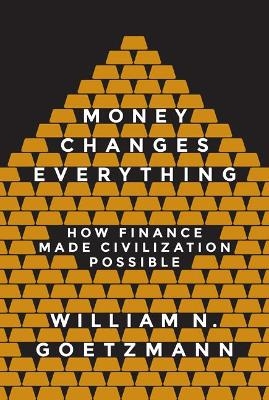
Money Changes Everything
Princeton University Press (Verlag)
978-0-691-17837-0 (ISBN)
"[A] magnificent history of money and finance."--New York Times Book Review "Convincingly makes the case that finance is a change-maker of change-makers."--Financial Times In the aftermath of recent financial crises, it's easy to see finance as a wrecking ball: something that destroys fortunes and jobs, and undermines governments and banks. In Money Changes Everything, leading financial historian William Goetzmann argues the exact opposite--that the development of finance has made the growth of civilizations possible. Goetzmann explains that finance is a time machine, a technology that allows us to move value forward and backward through time; and that this innovation has changed the very way we think about and plan for the future. He shows how finance was present at key moments in history: driving the invention of writing in ancient Mesopotamia, spurring the classical civilizations of Greece and Rome to become great empires, determining the rise and fall of dynasties in imperial China, and underwriting the trade expeditions that led Europeans to the New World.
He also demonstrates how the apparatus we associate with a modern economy--stock markets, lines of credit, complex financial products, and international trade--were repeatedly developed, forgotten, and reinvented over the course of human history. Exploring the critical role of finance over the millennia, and around the world, Goetzmann details how wondrous financial technologies and institutions--money, bonds, banks, corporations, and more--have helped urban centers to expand and cultures to flourish. And it's not done reshaping our lives, as Goetzmann considers the challenges we face in the future, such as how to use the power of finance to care for an aging and expanding population. Money Changes Everything presents a fascinating look into the way that finance has steered the course of history.
William N. Goetzmann is the Edwin J. Beinecke Professor of Finance and Management and director of the International Center for Finance at the Yale School of Management. His books include The Origins of Value: The Financial Innovations that Created the Modern Financial Markets and The Great Mirror of Folly: Finance, Culture, and the Crash of 1720.
Acknowledgments vii
Introduction 1
I FROM CUNEIFORM TO CLASSICAL CIVILIZATION 15
1 Finance and Writing 19
2 Finance and Urbanism 31
3 Financial Architecture 46
4 Mesopotamian Twilight 65
5 Athenian Finance 73
6 Monetary Revolution 92
7 Roman Finance 103
II THE FINANCIAL LEGACY OF CHINA 137
8 China's First Financial World 143
9 Unity and Bureaucracy 167
10 Financial Divergence 194
II I THE EUROPEAN CRUCIBLE 203
11 The Temple and Finance 207
12 Venice 221
13 Fibonacci and Finance 238
14 Immortal Bonds 249
15 The Discovery of Chance 258
16 Efficient Markets 276
17 Europe, Inc. 289
18 Corporations and Exploration 305
19 A Projecting Age 320
20 A Bubble in France 347
21 According to Hoyle 363
22 Securitization and Debt 382
IV THE EMERGENCE OF GLOBAL MARKETS 401
23 Marx and Markets 405
24 China's Financiers 423
25 The Russian Bear 443
26 Keynes to the Rescue 454
27 The New Financial World 467
28 Re-Engineering the Future 493
29 Post-War Theory 504
Conclusion 519
Afterword to the Paperback Edition 523
Notes 527
Bibliography 545
Illustration Credits 559
Index 561
| Erscheinungsdatum | 10.09.2017 |
|---|---|
| Nachwort | William N. Goetzmann |
| Zusatzinfo | 64 b/w illus. |
| Verlagsort | New Jersey |
| Sprache | englisch |
| Maße | 127 x 203 mm |
| Gewicht | 510 g |
| Themenwelt | Geschichte ► Teilgebiete der Geschichte ► Wirtschaftsgeschichte |
| Wirtschaft ► Betriebswirtschaft / Management ► Finanzierung | |
| Wirtschaft ► Volkswirtschaftslehre | |
| ISBN-10 | 0-691-17837-2 / 0691178372 |
| ISBN-13 | 978-0-691-17837-0 / 9780691178370 |
| Zustand | Neuware |
| Haben Sie eine Frage zum Produkt? |
aus dem Bereich


